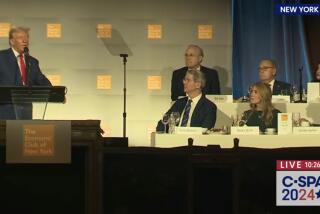Family Leave Bill Faces Veto, Bush Aide Says
- Share via
WASHINGTON — President Bush will veto legislation that would allow workers to take unpaid leave to deal with family emergencies, personal illness or the birth of a child, his chief of staff, John H. Sununu, told representatives of business lobbying groups Monday.
The legislation, which would require businesses with 50 or more employees to offer limited unpaid time off, is scheduled to be voted on by the House of Representatives on Wednesday.
Bush’s opposition, a White House spokeswoman said, was based on his belief that such issues should be decided by employers and their workers, rather than by the federal government.
“Anything that’s too rigid runs the risk of hurting the economy. We’re sensitive to that and we’re trying to be careful,” another White House official said.
“I can’t believe the kinder, gentler President is going to veto it,” retorted legislation supporter Rep. Patricia Schroeder (D-Colo.).
Under the House bill, workers would be guaranteed up to 10 weeks of unpaid leave to care for an elderly parent, a sick spouse, a newborn child, a newly adopted child or a seriously ill child over a two-year period. It would also provide up to 15 weeks of unpaid leave annually for a worker’s own medical needs. Employers would be required to continue paying health care benefits during the leave.
Federal workers would have the same guarantees but longer unpaid leave--18 weeks for family leave in a two-year period and 27 weeks a year for medical leave.
A version of the measure under consideration in the Senate would be applied to employers of 20 or more. They would be required to provide 10 weeks of unpaid leave to care for a newborn child, a newly adopted child, or a seriously ill child or parents. In addition, they would be required to provide up to 13 weeks of unpaid medical leave when employees themselves fall seriously ill.
The measures have become a point of focus for women’s rights groups, organized labor and a number of congressional Democratic leaders. Business groups which oppose the measure, including the U.S. Chamber of Commerce, assert that the bills are too costly and would give employers too little flexibility.
“There are only so many things an employer can offer,” said Mary Tavenner, a lobbyist for the National Assn. of Wholesaler-Distributors.
A senior White House official suggested some room for compromise with the measures’ supporters, saying: “We’re trying to warn them there are points beyond which the Congress should not push. Do they want legislation, or do they want to make a political point?”
The Institute for Women’s Policy Research has estimated that the incomes of working women and their families are reduced by $607 million annually in lost or reduced wages because of the lack of parental leave protection. The measures’ supporters claim that the United States and South Africa are the only industrialized nations without such a family leave policy.
With the House nearing a vote on the measure, business lobbyists called on Sununu at the White House. The chief of staff promised that “any bill that mandated employee benefits would be vetoed,” according to Alixe Glen, deputy White House press secretary.
Bush believes that “the marketplace takes care of this issue” and that “employees and employers have a better sense of these issues than Washington,” she said.
Kathy Bonk, spokeswoman for a coalition of groups supporting the legislation, said the House measure would exempt 93% of the nation’s employers. But, she said, because it covers larger companies, it would protect 60% of the American work force.
She noted it has attracted the backing of diverse interest groups, including organizations on both sides of the abortion issue.
A veto of the measure would put Bush and his Republican allies at odds with the supporters just as congressional elections approach.
More to Read
Get the L.A. Times Politics newsletter
Deeply reported insights into legislation, politics and policy from Sacramento, Washington and beyond. In your inbox twice per week.
You may occasionally receive promotional content from the Los Angeles Times.








